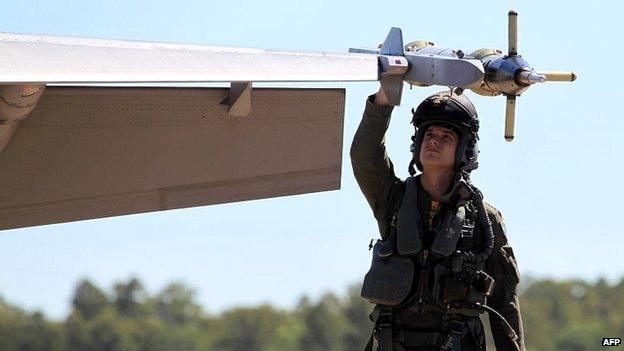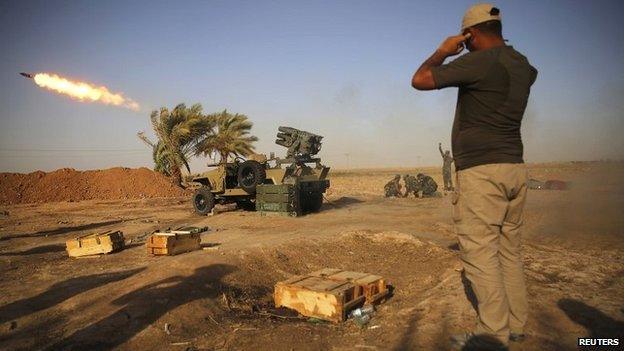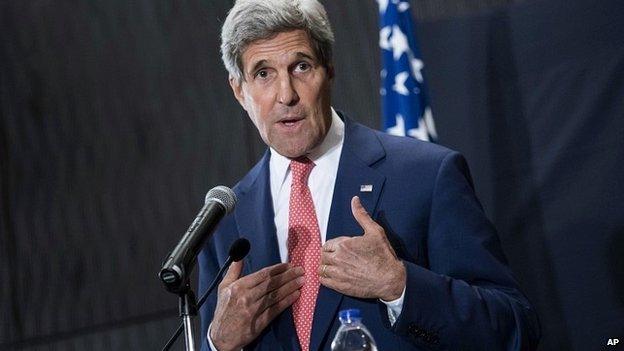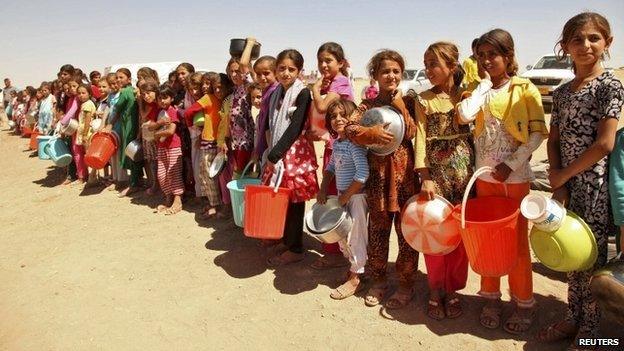Islamic State crisis: Australia to send 600 troops to UAE
- Published

The 600-strong force will include up to eight Super Hornet fighter jets, PM Abbott says
Australia says it is sending 600 troops to the Middle East ahead of possible combat operations against Islamic State (IS) militants in Iraq.
Prime Minister Tony Abbott said the deployment, initially to the United Arab Emirates, was in response to a specific US request.
Nearly 40 countries, including 10 Arab states, have signed up to a US-led plan to tackle the extremist group.
France is hosting a regional security summit on Monday.
US Secretary of State John Kerry arrived in Paris late on Saturday after a four-day tour of the Middle East trying to drum up support for action against IS.
Last week, US President Barack Obama presented a strategy to fight the group in both Iraq and Syria.
Speaking on Sunday, Prime Minister Abbott said Iraq had made it clear that it would "very much welcome" a military contribution to restore security.
Barbara Plett-Usher says Egypt and the US are united against a common threat
He said the force, which will also include up to eight Super Hornet fighter jets, was part of "an international coalition" not simply an "American-Australian operation".
Mr Abbott said no decision had yet been taken to commit the forces, which will begin deploying next week, to combat action.
The announcement comes two days after Australia raised its terrorism threat level from medium to high.
Security officials are thought to be concerned by the growing number of Australians "working with, connected to or inspired by" Islamist groups, Mr Abbott said on Friday.
Islamic State is now in control of large parts of Iraq and Syria and the CIA estimates that the group could have as many as 30,000 fighters in the region.

Iraqi forces are fighting alongside Kurdish fighters and Shia militias against Islamic State in northern Iraq

John Kerry has managed to secure the support of 10 Arab countries, including Saudi Arabia and Qatar
US air strikes have targeted IS in Iraq in recent weeks and President Obama has vowed to "hunt down" the group after it beheaded two American journalists.
Late on Saturday a video was also released appearing to show the beheading of UK hostage David Haines.
On Monday, French President Francois Hollande will welcome diplomats from up to 20 countries for a conference on Iraqi security.
The talks come ahead of a UN Security Council meeting next week and a heads of state meeting at the UN General Assembly later this month.
Iran unimpressed
One country not attending is Iran, which voiced its unhappiness at not being on the "selective guest list" by dismissing the talks as "just for show".
"What would interest Iran is a real fight against terrorism in the region and around the world, not this selective one," deputy foreign minister Hossein Amir-Abdollahian told state television.
On Friday, Mr Kerry said the US would not be seeking the involvement of Iran in its coalition because of its "engagement in Syria and elsewhere".
Iran has backed the government of President Bashar al-Assad in Syria, while the US and several European and Gulf countries have supported the rebel factions fighting to overthrow him.

The violence in Iraq in recent months is thought to have displaced an estimated 1.2 million people
The US stance was attacked in Iran, with one senior official accusing the US of playing a "central role" in "arming and training terrorist groups to topple the legal Syrian government".
"In taking a big jump ahead of international bodies, America seeks to emerge as a Hollywood-style hero battling a crisis of its own making," Admiral Ali Shamkhani, secretary of Iran's Supreme National Security Council, told state news agency IRNA.
In recent months IS has expanded from its stronghold in eastern Syria and seized control of more towns, cities, army bases and weaponry in Iraq.
The US has already carried out more than 150 air strikes in northern Iraq. It has also sent hundreds of military advisers to assist Iraqi government and Kurdish forces, but has ruled out sending ground troops.
